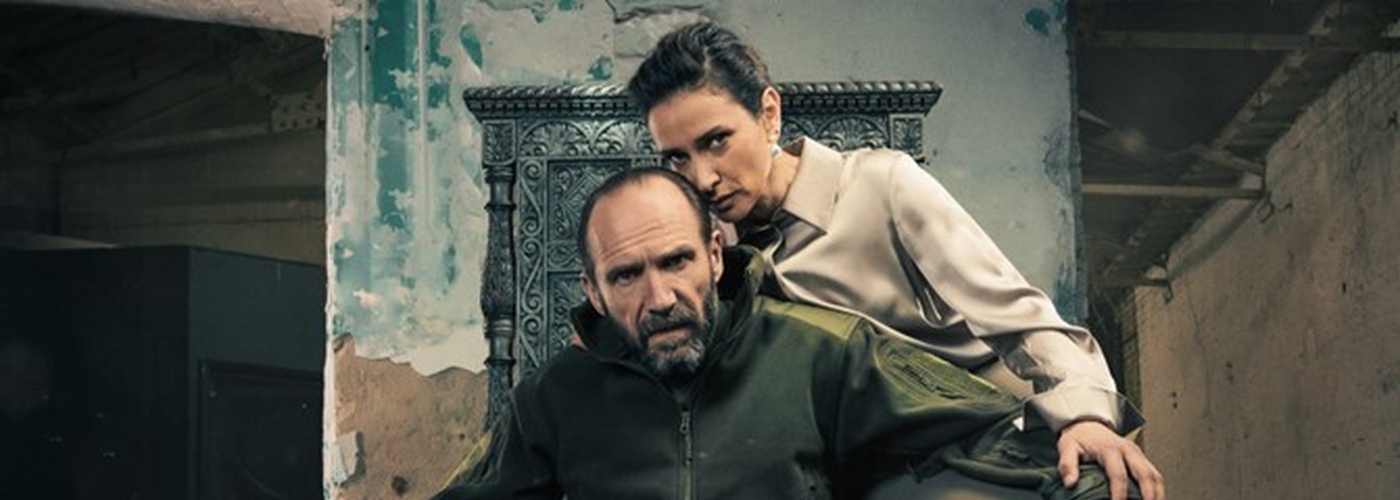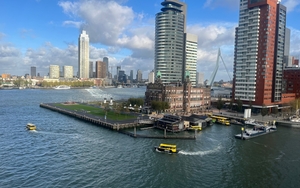Jonathan Schofield is confused by the direction, the staging and the location
Rating: 6/10. A strangely unintense experience in a location that's not been exploited to anywhere near its full potential.
What: Macbeth, directed by Simon Godwin, featuring Ralph Fiennes as Macbeth and Indira Varma as Lady Macbeth. The production comes from Wessex Grove and Underbelly.
Where: The Depot, 1 Digital Way, Fairfield, Liverpool L7 9NP
When: Until 20 December
How much: From £15 to £150
What Ralph Fiennes says (in an interview with The Times): “There is this idea that theatre is for people who go to work, come home, put on their nice suit, go for dinner and then ‘go to the theatre’. It’s a rather deadening culture that puts younger people off. In the West End, the ticket prices guide a certain strata of customer. How do we make theatre lose the stigma that it fits only the bourgeois?”
The big idea: Bringing Shakespeare to the people away from stuffy old theatres and into non-traditional dramatic spaces.
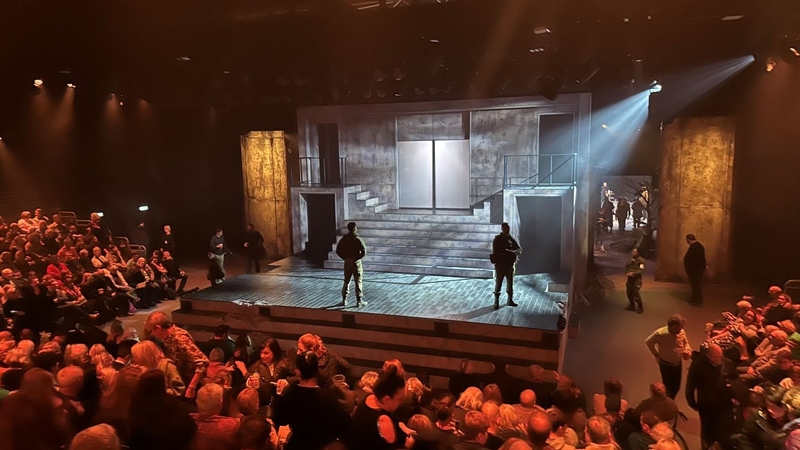
What we say: “At least we got to see Voldemort,” said one young woman behind me as the cast took the final bow.
She was right. We did see Voldemort, aka Ralph Fiennes, jousting with some of the finest lines ever written in the English language. We also saw him costumed as a modern day soldier along with the rest of the cast (aside from when they dressed like extras in a palace scene from Chitty Chitty Bang Bang or Shrek).
The whole costume design from Frankie Bradshaw, who also designed the set, is as achingly obvious as those warnings on McDonalds’ coffee cups telling people the liquid inside is hot. There is clearly some heavy-handed message behind the combat fatigues along the lines of the modern tyranny of modern Macbeths, Putin, perhaps, and also a reference to current conflicts around the world. It's a bit yawn-inducing and unoriginal.
The acting was good. Fiennes was good. Indira Varma was better as Lady Macbeth. Ben Turner, as Macduff, gave the best performance.
As usual the sheer splendour of Shakepeare’s use of the English language blows the mind. The play is illuminated by so many words and phrases now part of everyday language in one form or another.
Here are ten: ‘vaulting ambition’; ‘by the pricking of my thumbs something wicked this way comes’; ‘the milk of human kindness’; ‘double, double, toil and trouble, fire burn and cauldron bubble’; ‘fair is foul and foul is fair’; ‘blood must have blood’; ‘the blasted heath’; ‘screw your courage to the sticking place’; ‘out damned spot’; ‘What's done cannot be undone.’
Fiennes as a Macbeth about to meet his messy end delivers these key lines magnificently.
‘To-morrow, and to-morrow, and to-morrow, Creeps in this petty pace from day to day to the last syllable of recorded time? And all our yesterdays have lighted fools the way to dusty death. Out, out, brief candle! Life's but a walking shadow, a poor player that struts and frets his hour upon the stage. And then is heard no more: it is a tale told by an idiot, full of sound and fury, signifying nothing.’
Mind you, Danny Dyer could deliver these lines and they'd still sound powerful.
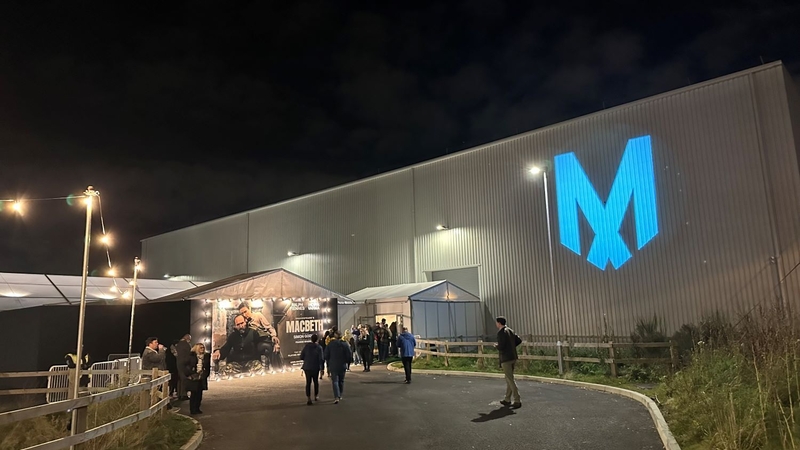
Yet, there is something about the production that fails to grip. It never quite catches fire. Godwin's direction lacks pace, appears disjointed.
The staging and the location is a major problem and the biggest one.
This Macbeth takes place in a purpose-built media production shed called The Depot a couple of miles out of the city just off Edge Lane. Externally the building resembles a unit on an industrial estate because it is a unit on an industrial estate. All the mighty marketing brains involved must have simply given up thinking of a better name and went with stating the bleeding obvious and settling on the moniker of the Depot. Not much ‘vaulting ambition’ there.
What was even more curious about the production was the very point of having a large purpose-built flexible studio space was ignored. Or to put it another way the flexibility of the flexible space was inflexibly used. It was hard to work out, in that case, what was the point of moving the production away from the familiar city centre theatre spaces of Liverpool. We sat staring at a completely normal stage set under a tin roof rather than a proscenium arch. The arch would have been preferable.
The temporary seating was poor and cramped. I’m a tall man and the man in the row in front of me was a tall man. He kept shifting. I had to shift with him performing a choreography of which the three weird sisters would have approved as they spun around on stage.
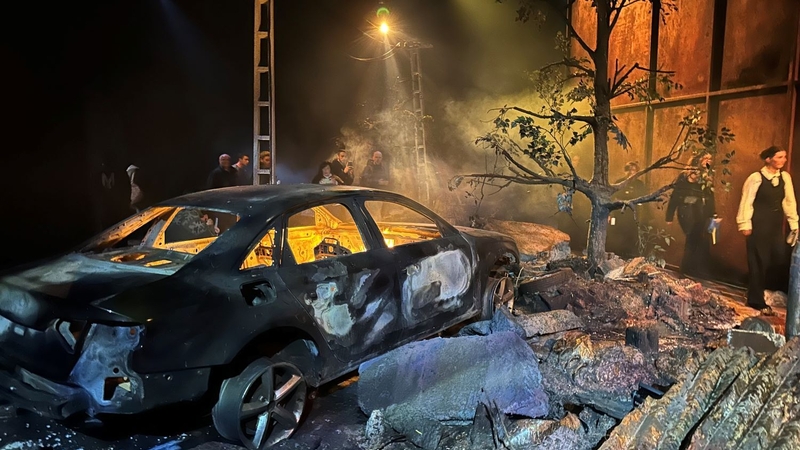
Before the play we were told we would walk through an immersive entrance that might get us in the mood for Macbeth. Well there’s a couple of Nazi-like banners over the bar and inbetween the bar and the stage there’s a burnt-out car. It all felt half-heartededly immersive.
As the crowds left the venue another problem of the location became apparent with limited taxi and public transport options. As people bumped into each other it occurred to me that the play should have been staged at Shakespeare North in Prescot. That's a fabulous space that could use the crowd pulling effect of this star-studded cast. (This is our review of the building.)
I’m spoilt I suppose.
In 2013 I saw the best Macbeth there has possibly ever been in a non-traditional space. This was Kenneth Branagh‘s production in Halle St Peters, a former church, in Ancoats, Manchester, for Manchester International Festival. Branagh had fun with the space. The seating was generous and formed of huge timber stands on each side of a stage that was the former nave of the building.
The action was so close to the audience that on one occasion, Alex Kingston, who was playing Lady Macbeth, swivelled her head so sharply she slapped me across the chops with her famous red hair.
Real water, acting very well as fake rain, fell from the ceiling during the opening scene and the floor was covered in thick mud the fighting actors splashed about in. This was a purely visceral Macbeth that captured the mood of the play perfectly and matched the acting. It was everything this production in Liverpool could have been but wasn’t.
I might as well carry on whinging.
If Fiennes and co think they are taking this Macbeth to the people and away from the bourgeoisie, then that’s not working, because, they seem to have forgotten Northern audiences are very different from those at West End theatres, less bourgeoisie. Indeed, the audience at The Depot didn’t seem any different from that which you might see at the Everyman. True, there are tickets for £15 but there aren’t many of them and there are also tickets for £150. Simply by having nice intentions doesn’t mean there’s any resulting delivery.
In the end the acting in this Macbeth was let down by the staging, set, costume design and Godwin's insipid direction.
Much of it seemed faintly condescending in conception and faintly half-arsed in delivery.
At least we got to see Voldemort.
Main picture: copyright Oliver Rosser
Get the latest news to your inbox
Get the latest food & drink news and exclusive offers by email by signing up to our mailing list. This is one of the ways that Confidentials remains free to our readers and by signing up you help support our high quality, impartial and knowledgable writers. Thank you!

Join our WhatsApp group
You can also get regular updates on news, exclusives and offers by joining the Manchester Confidential WhatsApp group.






